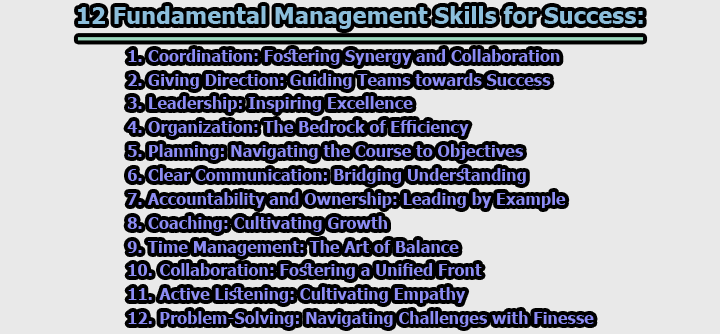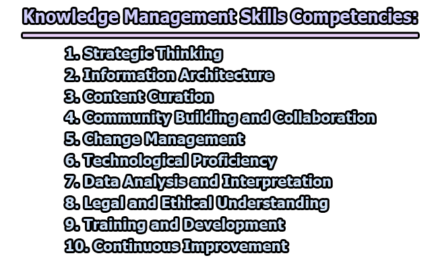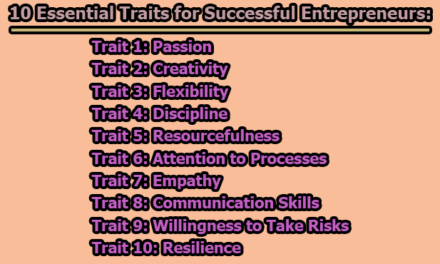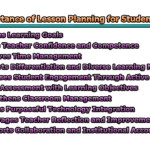12 Fundamental Management Skills for Success:
In the ever-evolving landscape of business, effective management skills have become indispensable for navigating the complexities and challenges that organizations face. Managers play a pivotal role in orchestrating teams, driving projects, and ensuring the overall success of their departments. To excel in this multifaceted role, managers must develop a diverse range of skills that enable them to lead with confidence and precision. This article delves into the 12 fundamental management skills for success (that not only elevate managers’ capabilities but also contribute to the growth and prosperity of their teams and organizations).
1. Coordination: Fostering Synergy and Collaboration: Central to a manager’s role is the ability to facilitate coordination among team members and departments. Effective coordination ensures that teams work cohesively towards shared objectives. Managers must identify resource gaps, encourage cross-functional collaboration, and streamline processes. By fostering synergy, managers create an environment where innovation flourishes and productivity soars.
2. Giving Direction: Guiding Teams towards Success: Guidance is the cornerstone of effective management. Managers must provide clear direction, set expectations, and delegate responsibilities. This involves aligning individual strengths with project requirements, promoting accountability, and ensuring that every team member understands their role in achieving the overarching goals. By offering purposeful guidance, managers inspire confidence and create a roadmap to success.
3. Leadership: Inspiring Excellence: Leadership transcends mere management; it entails inspiring individuals to transcend their potential. Influential leaders create a vision, communicate it effectively, and motivate their teams to pursue excellence. Leadership is about fostering an environment of open communication, soliciting feedback, recognizing contributions, and delegating strategically. By cultivating strong leadership skills, managers become catalysts for positive change and sustainable growth.
4. Organization: The Bedrock of Efficiency: In the dynamic business landscape, organizational skills are paramount. Managers are entrusted with overseeing multiple projects with distinct timelines and requirements. Effective organization ensures that deadlines are met, resources are optimized, and stress is minimized. With meticulous planning and prioritization, managers streamline workflows, enhance efficiency, and ensure that the right resources are allocated to the right tasks.
5. Planning: Navigating the Course to Objectives: Planning is the compass that guides managerial decisions and actions. Whether it’s aligning company-wide objectives or strategizing for specific projects, managers must be adept at formulating comprehensive plans. This involves identifying key milestones, allocating resources, and anticipating potential roadblocks. Effective planning allows managers to chart a clear course toward success and adapt proactively to changing circumstances.
6. Clear Communication: Bridging Understanding: Effective communication is the linchpin of successful management. Managers must articulate ideas, strategies, and expectations clearly and succinctly. Clear communication fosters a shared understanding among team members, minimizes misunderstandings, and aligns efforts toward common goals. Moreover, emotional intelligence is crucial in building trust and rapport, enabling managers to navigate difficult conversations and facilitate collaborative problem-solving.
7. Accountability and Ownership: Leading by Example: Just as managers hold their team members accountable, they must also demonstrate accountability and ownership in their own roles. Embracing a sense of ownership enhances credibility and fosters a culture of integrity. When managers take ownership of their decisions and outcomes, it reinforces a sense of responsibility across the team and instills a commitment to delivering results.
8. Coaching: Cultivating Growth: Effective managers are also adept coaches. They recognize the importance of nurturing their team members’ growth and development. Through mentoring, training, and feedback, managers empower individuals to acquire new skills and refine existing ones. By investing in coaching, managers not only elevate the competencies of their team but also foster an environment of continuous learning and improvement.
9. Time Management: The Art of Balance: Time is a finite resource, and mastering its allocation is crucial for managers. Effective time management allows managers to juggle multiple responsibilities without compromising quality or well-being. By understanding their limitations, setting priorities, and making conscious commitments, managers ensure that their energy is directed toward tasks that drive the greatest impact.
10. Collaboration: Fostering a Unified Front: Collaboration is the heartbeat of organizational success. Managers must champion a culture of teamwork and facilitate collaboration both within their teams and across departments. By breaking down silos, sharing insights, and encouraging cross-functional cooperation, managers enhance productivity and innovation. A collaborative environment nurtures diverse perspectives, leading to well-rounded solutions and heightened employee engagement.
11. Active Listening: Cultivating Empathy: Listening is a cornerstone of effective communication, and active listening takes it a step further. Managers must engage in attentive listening, seeking to understand before being understood. This not only promotes empathy but also strengthens interpersonal relationships. By truly comprehending team members’ concerns, ideas, and feedback, managers foster an inclusive and supportive work environment.
12. Problem-Solving: Navigating Challenges with Finesse: In the realm of management, challenges are inevitable. Successful managers are skilled problem-solvers who approach issues methodically. They gather insights, consider various perspectives, and make informed decisions. Effective problem-solving involves leveraging effective communication, learning from team input, and prioritizing solutions based on available information. A manager’s adeptness in problem-solving often defines their ability to navigate uncertainties and steer their team towards successful outcomes.
It is apparent that effective management is a dynamic blend of art and science, requiring a diverse array of skills to navigate the complexities of today’s business landscape. From coordination and leadership to problem-solving and active listening, each of the 12 fundamental management skills outlined in this article plays a crucial role in shaping successful managers. By honing these skills, managers not only elevate their individual capabilities but also drive the growth, productivity, and innovation of their teams and organizations. As the business landscape continues to evolve, mastering these skills remains an evergreen investment in leadership excellence.

Assistant Teacher at Zinzira Pir Mohammad Pilot School and College










